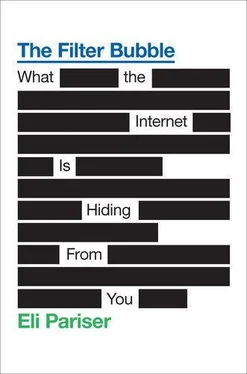I started doing some research, trying to understand how Facebook was deciding what to show me and what to hide. As it turned out, Facebook wasn’t alone.
WITH LITTLE NOTICEor fanfare, the digital world is fundamentally changing. What was once an anonymous medium where anyone could be anyone—where, in the words of the famous New Yorker cartoon, nobody knows you’re a dog—is now a tool for soliciting and analyzing our personal data. According to one Wall Street Journal study, the top fifty Internet sites, from CNN to Yahoo to MSN, install an average of 64 data-laden cookies and personal tracking beacons each. Search for a word like “depression” on Dictionary.com, and the site installs up to 223 tracking cookies and beacons on your computer so that other Web sites can target you with antidepressants. Share an article about cooking on ABC News, and you may be chased around the Web by ads for Teflon-coated pots. Open—even for an instant—a page listing signs that your spouse may be cheating and prepare to be haunted with DNA paternity-test ads. The new Internet doesn’t just know you’re a dog; it knows your breed and wants to sell you a bowl of premium kibble.
The race to know as much as possible about you has become the central battle of the era for Internet giants like Google, Facebook, Apple, and Microsoft. As Chris Palmer of the Electronic Frontier Foundation explained to me, “You’re getting a free service, and the cost is information about you. And Google and Facebook translate that pretty directly into money.” While Gmail and Facebook may be helpful, free tools, they are also extremely effective and voracious extraction engines into which we pour the most intimate details of our lives. Your smooth new iPhone knows exactly where you go, whom you call, what you read; with its built-in microphone, gyroscope, and GPS, it can tell whether you’re walking or in a car or at a party.
While Google has (so far) promised to keep your personal data to itself, other popular Web sites and apps—from the airfare site Kayak.comto the sharing widget AddThis—make no such guarantees. Behind the pages you visit, a massive new market for information about what you do online is growing, driven by low-profile but highly profitable personal data companies like BlueKai and Acxiom. Acxiom alone has accumulated an average of 1,500 pieces of data on each person on its database—which includes 96 percent of Americans—along with data about everything from their credit scores to whether they’ve bought medication for incontinence. And using lightning-fast protocols, any Web site—not just the Googles and Facebooks of the world—can now participate in the fun. In the view of the “behavior market” vendors, every “click signal” you create is a commodity, and every move of your mouse can be auctioned off within microseconds to the highest commercial bidder.
As a business strategy, the Internet giants’ formula is simple: The more personally relevant their information offerings are, the more ads they can sell, and the more likely you are to buy the products they’re offering. And the formula works. Amazon sells billions of dollars in merchandise by predicting what each customer is interested in and putting it in the front of the virtual store. Up to 60 percent of Netflix’s rentals come from the personalized guesses it can make about each customer’s movie preferences—and at this point, Netflix can predict how much you’ll like a given movie within about half a star. Personalization is a core strategy for the top five sites on the Internet—Yahoo, Google, Facebook, YouTube, and Microsoft Live—as well as countless others.
In the next three to five years, Facebook COO Sheryl Sandberg told one group, the idea of a Web site that isn’t customized to a particular user will seem quaint. Yahoo Vice President Tapan Bhat agrees: “The future of the web is about personalization… now the web is about ‘me.’ It’s about weaving the web together in a way that is smart and personalized for the user.” Google CEO Eric Schmidt enthuses that the “product I’ve always wanted to build” is Google code that will “guess what I’m trying to type.” Google Instant, which guesses what you’re searching for as you type and was rolled out in the fall of 2010, is just the start—Schmidt believes that what customers want is for Google to “tell them what they should be doing next.”
It would be one thing if all this customization was just about targeted advertising. But personalization isn’t just shaping what we buy. For a quickly rising percentage of us, personalized news feeds like Facebook are becoming a primary news source—36 percent of Americans under thirty get their news through social networking sites. And Facebook’s popularity is skyrocketing worldwide, with nearly a million more people joining each day. As founder Mark Zuckerberg likes to brag, Facebook may be the biggest source of news in the world (at least for some definitions of “news”).
And personalization is shaping how information flows far beyond Facebook, as Web sites from Yahoo News to the New York Times –funded startup News.mecater their headlines to our particular interests and desires. It’s influencing what videos we watch on YouTube and a dozen smaller competitors, and what blog posts we see. It’s affecting whose e-mails we get, which potential mates we run into on OkCupid, and which restaurants are recommended to us on Yelp—which means that personalization could easily have a hand not only in who goes on a date with whom but in where they go and what they talk about. The algorithms that orchestrate our ads are starting to orchestrate our lives.
The basic code at the heart of the new Internet is pretty simple. The new generation of Internet filters looks at the things you seem to like—the actual things you’ve done, or the things people like you like—and tries to extrapolate. They are prediction engines, constantly creating and refining a theory of who you are and what you’ll do and want next. Together, these engines create a unique universe of information for each of us—what I’ve come to call a filter bubble—which fundamentally alters the way we encounter ideas and information.
Of course, to some extent we’ve always consumed media that appealed to our interests and avocations and ignored much of the rest. But the filter bubble introduces three dynamics we’ve never dealt with before.
First, you’re alone in it. A cable channel that caters to a narrow interest (say, golf) has other viewers with whom you share a frame of reference. But you’re the only person in your bubble. In an age when shared information is the bedrock of shared experience, the filter bubble is a centrifugal force, pulling us apart.
Second, the filter bubble is invisible. Most viewers of conservative or liberal news sources know that they’re going to a station curated to serve a particular political viewpoint. But Google’s agenda is opaque. Google doesn’t tell you who it thinks you are or why it’s showing you the results you’re seeing. You don’t know if its assumptions about you are right or wrong—and you might not even know it’s making assumptions about you in the first place. My friend who got more investment-oriented information about BP still has no idea why that was the case—she’s not a stockbroker. Because you haven’t chosen the criteria by which sites filter information in and out, it’s easy to imagine that the information that comes through a filter bubble is unbiased, objective, true. But it’s not. In fact, from within the bubble, it’s nearly impossible to see how biased it is.
Finally, you don’t choose to enter the bubble. When you turn on Fox News or read The Nation , you’re making a decision about what kind of filter to use to make sense of the world. It’s an active process, and like putting on a pair of tinted glasses, you can guess how the editors’ leaning shapes your perception. You don’t make the same kind of choice with personalized filters. They come to you—and because they drive up profits for the Web sites that use them, they’ll become harder and harder to avoid.
Читать дальше











